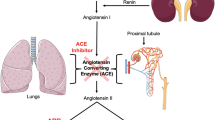Abstract
Background. We have reported that β 2 adrenoreceptor (β 2AR) stimulation is anti-apoptotic, and has strong beneficial effect on cardiac remodeling in an experimental model of post myocardial infarction chronic heart failure (CHF) in rats. Here we investigate whether the addition of chronic pharmacological β 2AR stimulation enhances the therapeutic effects of β 1AR blockade on cardiac remodeling in the same model. Methods and Results. Metoprolol, a β 1AR blocker, given alone (β 1) or in combination with β 2AR agonist, fenoterol (β 1β 2) were administered to rats via drinking water for 6 weeks, beginning 2 weeks following permanent coronary ligation. Progressive left ventricular (LV) remodeling of untreated animals, assessed by repeated echocardiography, occurred during the observation time, i.e., 42% and 25% increases in end-systolic and end-diastolic LV volumes respectively, 27% fall in ejection fraction, and 35% infarct expansion. Pressure-volume loop analyses at 2d and 8th post infarction weeks showed continuous deterioration of systolic and diastolic functions and arterio-ventricular mismatch. Histological evaluation at the end of 8 weeks revealed the MI expansion and hypertrophy of cardiomyocytes. β 1β 2 prevented LV remodeling, MI expansion and cardiomyocytes hypertrophy to a greater degree than β 1, due, in large part, to a vasodilatory effect of β 2AR stimulation and thus improvement of arterio-ventricular mismatch. The abnormal diastolic performance improved only in β 1β 2. β 1β 2 treatment reduced myocardial apoptosis throughout myocardium, but β 1 reduced apoptopsis only in the areas remote from MI. Conclusion. The therapeutic effects of chronic β 1AR blockade on cardiac remodeling of heart failure are enhanced and extended when supplemented with β 2AR stimulation.
Similar content being viewed by others
References
Wencker D, Chandra M, Nguyen K, et al. A mechanistic role for cardiac myocyte apoptosis in heart failure. J Clin Invest 2003;111:1497–1504.
Sabbah HN. The cellular and physiologic effects of beta blockers in heart failure. Clin Cardiol 1999;22:V16–V20.
Hjalmarson A, Goldstein S, Fagerberg B, et al. Effects of controlled-release metoprolol on total mortality, hospitalizations, and well-being in patients with heart failure: the Metoprolol CR/XL Randomized Intervention Trial in congestive heart failure (MERIT-HF). JAMA 2000;283:1295–1302.
Bristow MR. Mechanism of action of beta-blocking agents in heart failure. Am J Cardiol 1997;80:26L–40L.
Chesley A, Lundberg MS, Asai T, et al. The beta (2)-adrenergic receptor delivers an antiapoptotic signal to cardiac myocytes through G(i)-dependent coupling to phosphatidylinositol 3'-kinase. Circ Res 2000;87:1172–1179.
Communal C, Singh K, Sawyer DB, Colucci WS. Opposing effects of beta (1)- and beta (2)-adrenergic receptors on cardiac myocyte apoptosis: role of a pertussis toxin-sensitive G protein. Circulation 1999;100:2210–2212.
Zhu WZ, Zheng M, Koch WJ, et al. Dual modulation of cell survival and cell death by beta (2)-adrenergic signaling in adult mouse cardiac myocytes. Proc Natl Acad Sci USA. 2001;98:1607–1612.
Ahmet I, Krawczyk M, Heller P, et al. Beneficial Effects of Chronic Pharmacologic Manipulation of β-Adrenoreceptor Subtype Signaling in Rodent Dilated Ischemic Cardiomyopathy. Circulation 2004;110:1083– 1090.
Hochman JS, Bulkley BH. Expansion of acute myocardial infarction: an experimental study. Circulation 1982;65:1446–1450.
Duan WR, Garner DS, Williams SD, Funckes-Shippy CL, Spath IS, Blomme EAG. Comparison of immunohistochemistry for activated caspase-3 and cleaved cytokertin 18 with the TUNEL method for quantification of apoptosis in histological sections of PC-3 cubcutaneous xenografs. J Pathol 2003;199:221–228.
Schwarz ER, Kersting PH, Reffelmann T, Meven DA, Al-Dashti R, Skobel EC, Klosterhalfen B, Hanrath P. Cardioprotection by Carvedilol: antiapoptosis is independent of beta-adrenoceptor blockage in the rat heart. J Cardiovasc Pharmacol Ther 2003;8:207–215.
Torp-Pedersen C, Poole-Wilson PA, Swedberg K, Cleland JG, Di Lenarda A, Hanrath P, Komajda M, Lutiger B, Metra M, Remme WJ, Scherhag A, Skene A. COMET Investigators. Effects of metoprolol and carvedilol on cause-specific mortality and morbidity in patients with chronic heart failure–COMET. Am Heart J Feb 2005;149:370–376.
Yaoita H, Sakabe A, Maehara K, Maruyama Y. Different effects of carvedilol, metoprolol, and propranolol on left ventricular remodeling after coronary stenosis or after permanent coronary occlusion in rats. Circulation 2002;105:975–980.
Wei S, Chow LT, Sanderson JE. Effect of carvedilol in comparison with metoprolol on myocardial collagen postinfarction. J Am Coll Cardiol 2000;36:276–281.
Sia YT, Parker TG, Tsoporis JN, Liu P, Adam A, Rouleau JL. Long-term effects of carvedilol on left ventricular function, remodeling, and expression of cardiac cytokines after large myocardial infarction in the rat. J Cardiovasc Pharmacol 2002;39:73–87.
Pearce N, Crane J, Burgess C, et al. Fenoterol and asthma mortality. Lancet 1989;1:1196–1197.
Martin RM, Dunn NR, Freemantle SN, et al. Risk of non-fatal cardiac failure and ischaemic heart disease with long acting beta 2 agonists. Thorax 1998;53:558–562.
Lindmark B, Ottosson A. Beta2 agonists and heart failure. Lancet 1998;352:1709–1710.
Xiao RP, Ji X, Lakatta EG. Functional coupling of the beta 2-adrenoceptor to a pertussis toxin-sensitive G protein in cardiac myocytes. Mol Pharmacol 1995;47:322–329.
Author information
Authors and Affiliations
Corresponding author
Additional information
This research was supported by the Intramural Research Program of the National Institute on Aging, NIH.
Rights and permissions
About this article
Cite this article
Ahmet, I., Lakatta, E.G. & Talan, M.I. Pharmacological Stimulation of β 2-adrenergic Receptors (β 2AR) Enhances Therapeutic Effectiveness of β 1AR Blockade in Rodent Dilated Ischemic Cardiomyopathy. Heart Fail Rev 10, 289–296 (2005). https://doi.org/10.1007/s10741-005-7543-3
Published:
Issue Date:
DOI: https://doi.org/10.1007/s10741-005-7543-3




